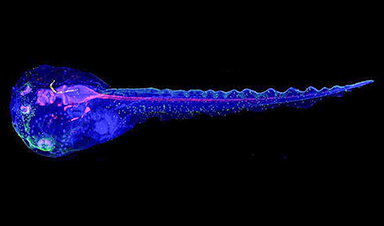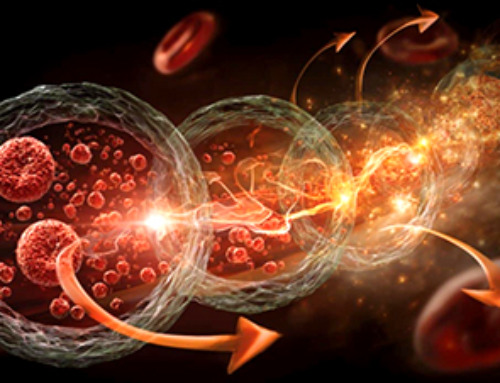The world’s largest study of the genetics of critical Covid-19, involving more than 57,000 people, has revealed fresh details about some of the biological mechanisms behind the severe form of the disease.
Some 16 new genetic variants associated with severe Covid-19, including some related to blood clotting, immune response and intensity of inflammation, have been identified.
These findings will act as a roadmap for future efforts, opening new fields of research focused on potential new therapies and diagnostics with pinpoint accuracy, experts say.
Researchers from the GenOMICC consortium — a global collaboration to study genetics in critical illness — led by University of Edinburgh in partnership with Genomics England, made these discoveries by sequencing the genomes of 7,491 patients from 224 intensive care units in the UK.
Their DNA was compared with 48,400 other people who had not had Covid-19, participants in Genomics England’s 100,000 Genomes Project and that of a further 1,630 people who had experienced mild Covid.
Determining the whole genome sequence for all participants in the study allowed the team to create a precise map and identify genetic variation linked to severity of Covid-19. The team found key differences in 16 genes in the ICU patients when compared with the DNA of the other groups.
They also confirmed the involvement of seven other genetic variations already associated with severe Covid-19 discovered in earlier studies from the same team.
The findings included how a single gene variant that disrupts a key messenger molecule in immune system signaling — called interferon alpha-10 — was enough to increase a patient’s risk of severe disease.
This highlights the gene’s key role in the immune system and suggests that treating patients with interferon — proteins released by immune cells to defend against viruses — may help manage disease in the early stages.
The study also found that variations in genes that control the levels of a central component of blood clotting — known as Factor 8 — were associated with critical illness in Covid-19.
This may explain some of the clotting abnormalities that are seen in severe cases of Covid-19. Factor 8 is the gene underlying the most common type of haemophilia.
Professor Kenneth Baillie, the project’s chief investigator and a Consultant in Critical Care Medicine at University of Edinburgh, said: “Our latest findings point to specific molecular targets in critical Covid-19. These results explain why some people develop life-threatening Covid-19, while others get no symptoms at all. But more importantly, this gives us a deep understanding of the process of disease and is a big step forward in finding more effective treatments.
“It is now true to say that we understand the mechanisms of Covid better than the other syndromes we treat in intensive care in normal times — sepsis, flu, and other forms of critical illness. Covid-19 is showing us the way to tackle those problems in the future.”
Professor Sir Mark Caulfield from Queen Mary University of London, formerly Chief Scientist at Genomics England and co-author on this study, said: “As Covid-19 evolves, we need to focus on reducing the number of people getting seriously ill and being hospitalised. Through our whole genome sequencing research, we’ve discovered novel gene variants that predispose people to severe illness — which now offer a route to new tests and treatments, to help protect the public and the NHS from this virus.”
Dr Rich Scott, Chief Medical Officer at Genomics England, said: “Strategically, we’re at a point where genomic science is becoming an integral part of the national infrastructure in routine healthcare. This study illustrates the value of whole genome sequencing to detect rare and common variants that influence critical illness requiring intensive care. It represents a major leap forward in our understanding of how our genetic makeup influences severe illness with Covid-19.”
“All those involved in the study went to great efforts to engage with all communities within the UK — including groups that have historically been under-represented in medical studies. The inclusive element of our work has generated meaningful results for everyone in the country.”
Lord Kamall, Minister for innovation at the Department of Health and Social Care (DHSC), said: “Clinical research has been vital in our fight against Covid-19 and the UK’s innovation is enabling us to transform our health service and ensure the NHS is able to deliver world-class care.
“This research is an important step forward in better understanding how Covid-19 impacts certain people, allowing us to take the necessary action to protect the most vulnerable and save lives.”
The findings have been published in Nature.
GenOMICC (Genetics of Susceptibility and Mortality in Critical Care) started in 2015 as an open, global consortium of intensive care clinicians dedicated to understanding genetic factors influencing outcomes in intensive care from diseases such as SARS, flu and sepsis.
The consortium is led by the University of Edinburgh, and since 2020 it has been focused on Covid-19 research in partnership with Genomics England and in collaboration with NHS Lothian, the Intensive Care National Audit and Research Centre (ICNARC), and Queen Mary University of London.
The ground-breaking 100,000 Genomes Project was established in 2014 to sequence 100,000 genomes from people with a rare disease or cancer. The Project was completed in 2018 and paved the way for the creation of a new genomic medicine service for NHS England, transforming patient care by bringing advanced diagnosis and personalised treatments.
News
AI matches doctors in mapping lung tumors for radiation therapy
In radiation therapy, precision can save lives. Oncologists must carefully map the size and location of a tumor before delivering high-dose radiation to destroy cancer cells while sparing healthy tissue. But this process, called [...]
Scientists Finally “See” Key Protein That Controls Inflammation
Researchers used advanced microscopy to uncover important protein structures. For the first time, two important protein structures in the human body are being visualized, thanks in part to cutting-edge technology at the University of [...]
AI tool detects 9 types of dementia from a single brain scan
Mayo Clinic researchers have developed a new artificial intelligence (AI) tool that helps clinicians identify brain activity patterns linked to nine types of dementia, including Alzheimer's disease, using a single, widely available scan—a transformative [...]
Is plastic packaging putting more than just food on your plate?
New research reveals that common food packaging and utensils can shed microscopic plastics into our food, prompting urgent calls for stricter testing and updated regulations to protect public health. Beyond microplastics: The analysis intentionally [...]
Aging Spreads Through the Bloodstream
Summary: New research reveals that aging isn’t just a local cellular process—it can spread throughout the body via the bloodstream. A redox-sensitive protein called ReHMGB1, secreted by senescent cells, was found to trigger aging features [...]
AI and nanomedicine find rare biomarkers for prostrate cancer and atherosclerosis
Imagine a stadium packed with 75,000 fans, all wearing green and white jerseys—except one person in a solid green shirt. Finding that person would be tough. That's how hard it is for scientists to [...]
Are Pesticides Breeding the Next Pandemic? Experts Warn of Fungal Superbugs
Fungicides used in agriculture have been linked to an increase in resistance to antifungal drugs in both humans and animals. Fungal infections are on the rise, and two UC Davis infectious disease experts, Dr. George Thompson [...]
Scientists Crack the 500-Million-Year-Old Code That Controls Your Immune System
A collaborative team from Penn Medicine and Penn Engineering has uncovered the mathematical principles behind a 500-million-year-old protein network that determines whether foreign materials are recognized as friend or foe. How does your body [...]
Team discovers how tiny parts of cells stay organized, new insights for blocking cancer growth
A team of international researchers led by scientists at City of Hope provides the most thorough account yet of an elusive target for cancer treatment. Published in Science Advances, the study suggests a complex signaling [...]
Nanomaterials in Ophthalmology: A Review
Eye diseases are becoming more common. In 2020, over 250 million people had mild vision problems, and 295 million experienced moderate to severe ocular conditions. In response, researchers are turning to nanotechnology and nanomaterials—tools that are transforming [...]
Natural Plant Extract Removes up to 90% of Microplastics From Water
Researchers found that natural polymers derived from okra and fenugreek are highly effective at removing microplastics from water. The same sticky substances that make okra slimy and give fenugreek its gel-like texture could help [...]
Instant coffee may damage your eyes, genetic study finds
A new genetic study shows that just one extra cup of instant coffee a day could significantly increase your risk of developing dry AMD, shedding fresh light on how our daily beverage choices may [...]
Nanoneedle patch offers painless alternative to traditional cancer biopsies
A patch containing tens of millions of microscopic nanoneedles could soon replace traditional biopsies, scientists have found. The patch offers a painless and less invasive alternative for millions of patients worldwide who undergo biopsies [...]
Small antibodies provide broad protection against SARS coronaviruses
Scientists have discovered a unique class of small antibodies that are strongly protective against a wide range of SARS coronaviruses, including SARS-CoV-1 and numerous early and recent SARS-CoV-2 variants. The unique antibodies target an [...]
Controlling This One Molecule Could Halt Alzheimer’s in Its Tracks
New research identifies the immune molecule STING as a driver of brain damage in Alzheimer’s. A new approach to Alzheimer’s disease has led to an exciting discovery that could help stop the devastating cognitive decline [...]
Cyborg tadpoles are helping us learn how brain development starts
How does our brain, which is capable of generating complex thoughts, actions and even self-reflection, grow out of essentially nothing? An experiment in tadpoles, in which an electronic implant was incorporated into a precursor [...]





















